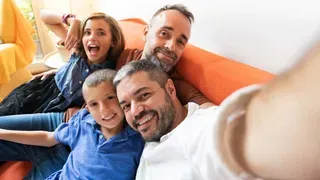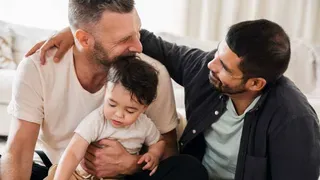
September 19, 2024
Focus on The Prelude Network's IVF Providers: Why We Do What We Do
Kilian Melloy READ TIME: 7 MIN. SPONSORED
In vitro fertilization – IVF – is a medical means to make parenthood possible for countless families who would be unable to achieve their dream of parenthood without some form of assistance. For queer families, especially, IVF is a primary means of achieving cherished family-building goals.
Simply put, IVF is a scientific intervention in which two people's gametes – their genetic contributions to a new life – are brought together under laboratory conditions. Once a sperm and an egg are united, an embryo forms, initiating the human life cycle. The embryo is then implanted into the uterus of the pregnancy's carrier, which might be a member of the family looking to have a child, or it might be a surrogate who is helping a couple build their family.
IVF also involves the efforts and the expertise of providers like doctors, nurses, and technicians. The providers working at the 90+ clinics of The Prelude Network – North America's largest and fastest-growing network of fertility clinics – give prospective parents their support and attention, tailoring each family's specific needs and wishes into a plan for making their dreams come true.

Source: Courtesy Main Line Fertility
Why do these providers do what they do?
A willingness to help plays a part. Fertility doctors know that facilitating pregnancy for families that need a little help comes down to just a few essentials: Bringing sperm and egg together is one key component; implanting the resulting embryo into the womb of a parent or a surrogate is another. Providing expertise to families who want children is an enormously satisfying career. As Dr. Allison Bloom, a reproductive endocrinologist with Main Line Fertility, a Pennsylvania-based fertility clinic with six locations around the state of Pennsylvania, puts it, "I always ask patients what they see their family looking like in the future. What the desired number of children? Who wants to be a biological parent? Do they need donor sperm? Do they need donor eggs? Do they need a gestational carrier? There are so many thoughts in the conversation that really help us guide how someone moves forward."
All those moving parts prove no obstacle to the expertise of providers like Dr. Bloom. But a large part of why the providers at The Prelude Network do what they do also comes down to empathy. Some IVF providers rely on the very science they provide in service to others to fulfill their own family-building needs, and that includes both straight and LGBTQ+ providers.
Dr. Bloom recalls when she and her wife began their own family-building journey. "After a year and a half, we utilized IVF to have our twin boys. Our experience only furthered my interest and passion for helping individuals and families build their own families, especially for the LGBTQ+ community."

Source: Courtesy Aspire HFI
Dr. Heather Hoff, a provider with Aspire HFI in Houston, Texas, also went through the IVF journey with her own wife.
"We actually went through the reciprocal IVF process," Dr. Hoff details, referencing how two people with wombs in a partnership can carry embryos conceived with each other's ova. "We have two IVF babies," Dr. Hoff adds, "so I can talk about this from all aspects. It was a bit of a journey for us too, but it has made me such a better doctor, and, especially for my same-sex couples, it really allows me to walk them through the process from a perspective that is not possible otherwise."
Dr. Hoff details why that is: "We were looking for sperm donors," as many patients that come to her clinic must. "We went through that process. I can tell them everything about the different websites and the catalogs and help them to understand how to prioritize."
The IVF journey can be a long one, requiring multiple attempts. Dr. Hoff and her family are proof that persistence pays off.
"We actually had a year of difficulty and challenges with our cycles," she recalls, referring to the process by which a patient with ovaries undergoes stimulation for the production of eggs to be used in IVF. "So, that is another perspective that I can give to them."
And there's always the possibility of unforeseen circumstances. "Sometimes there is something that comes up that is a hurdle we weren't anticipating," Dr. Hoff notes. "And then we have to figure out, 'How do we navigate that?' I think that that's something that I've learned that has changed my counseling, my approach, and my perspective, and it has been enormously beneficial."

Source: Courtesy Center for Reproductive Medicine
It's much the same with Dr. Randall Loy, who has been with the Center for Reproductive Medicine in Orlando, Florida for 35 of the clinic's 39 years. Dr. Loy and his wife made use of IVF for three of their four sons.
The ability to create embryos and delay their implantation to initiate pregnancy led to something of an amusing anecdote for their family. As Dr. Loy relates, "We were at a Thai restaurant and I asked, 'Who is the oldest?' And my four sons looked at me incredulously and said, 'Well, of course, Asher's the oldest.' And I said, 'Yes, you're right. Who's next oldest?'
The answer wasn't as straightforward as his sons expected. Dr. Loy explains, "It turns out that our oldest son and our twin sons were in the petri dish at the same time. But son number two turned out to be natural – and miraculous, by the way – so the second-born son was actually younger than our twins, who were three-plus years his junior!
"I know that's confusing," Dr. Loy chuckles, "but yes, we did have to use IVF, and three of our four sons are IVF babies."
With that empathy for what the IVF journey entails, there also comes a fundamental sympathy for the basic human need to share the gift of life with offspring.
"We try to treat everybody compassionately, as if they're family," Dr. Loy says, "and we try to provide them with their needs. I think everybody's looking for basic human needs – love and acceptance – and so we try to show that love to these couples, and we try to accept them and dignify their desires."
"We were married for 13 years before our first son was born," Dr. Loy adds, "and we had gone through different surgeries, different treatments, and it gets old fast. This gives me special compassion for the patients who have gone through this."
But the greatest reason why IVF providers do what they do might just be the pure joy of seeing a family welcome a child into the world – and grateful new parents often share their joy with the fertility providers who helped make it possible.
"I have two huge boxes of thousands and thousands of photos," Dr. Loy reveals, producing a photo of a newborn wearing a tiny shirt that reads "The Little Embryo That Could" and clutching an image of himself as a cluster of just-formed cells.
"I love this picture. This was his was him as an embryo," Dr. Loy explains, pointing to the image of the cells, "and here he is just delivered."
It's the miracle of life – a miracle that The Prelude Network helps bring to all families, whether they are queer or straight, and no matter what their unique configuration may be.
Kilian Melloy serves as EDGE Media Network's Associate Arts Editor and Staff Contributor. His professional memberships include the National Lesbian & Gay Journalists Association, the Boston Online Film Critics Association, The Gay and Lesbian Entertainment Critics Association, and the Boston Theater Critics Association's Elliot Norton Awards Committee.
This story is part of our special report: "Inception Fertility". Want to read more? Here's the full list.







